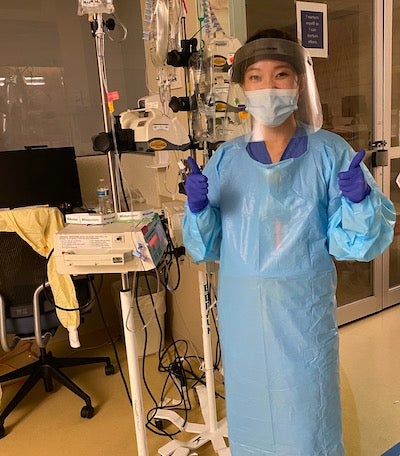BSN Alumna Who Serves as a Pediatric Nurse Now Caring for Patients in COVID-19 ICUs
May 13, 2020 – Since graduation and licensure, Emily Varua (NHS’19), a BSN alumna, has been caring for children at Morristown Medical Center in New Jersey. For weeks now, she has expanded her areas of practice to assist with the center’s COVID-19 response, including working in the Pediatric Intensive Care Unit and the Surgical Intensive Care Unit.

“I first started working with COVID-19 pediatric patients the second week of March in the PICU ‘pod’ and then shifted to adult ICUs in the last week of March,” she said. “The number of pediatric patients being affected with COVID-19 is significantly less than adults though.”
The “pod” is an area where children are cared for who either have COVID-19 or are being tested for the virus. “Most of our kids have been ‘rule-outs’, meaning they’re placed in the pod while their COVID-19 test is pending,” she said. “If the test comes back negative, we immediately transfer them to our non-COVID-19 floor. Meanwhile, there are nine different adult ICUs across my hospital, treating over 100 adult patients.”
Changes to Practice
“When I’m assigned to the PICU ‘pod,’ I’m still responsible for pediatric patients, but I have to alter my nursing practices to comply with COVID-19 protocols implemented by my hospital to keep myself, my coworkers, and other patients as safe and protected as possible,” Varua noted. “For example, we are limited to entering COVID-19 patient rooms to twice or three times a shift; whereas, under normal circumstances, we’d be going in almost every hour.”
The hospital, she said, is allowing one caregiver to stay with a pediatric patient in the room. But to inhibit virus transmission, the caregiver must either remain in the room with the patient the entire time or choose to leave and not return.
“While this policy sounds extreme, the hospital is ultimately trying to prevent the spread of the virus by limiting foot traffic,” she said. “Adult patients in the ICUs aren’t allowed to have anyone at the bedside.”
A big part of Varua’s focus has been the caregivers. “Working with this patient population isn’t just about caring for the patient,” she said, “but also supporting the caregivers through the child’s hospital stay. My ability to do so has been greatly inhibited though, considering the restrictions around entering COVID-19 patient rooms. We’ve resorted to placing iPads in patient rooms to communicate with families via FaceTime, but this is no replacement for the element of human touch that drives healing.”
Emotional Moments
In the SICU, Varua has been assisting the adult ICU nursing team, which has been an “intense yet highly informative experience” for her.
“The hardest thing I’ve faced since working with adults is seeing them fight this virus alone,” she said.
With the hospital’s no visitor policy during this pandemic, Varua has noticed an increased pressure on the nursing staff.
“This aspect of nursing is where this virus really takes a toll on health care workers,” she said. “I see how deflated my coworkers are when they have to deliver bad news over the phone. I see how upsetting it is for the staff when they are so overwhelmed that they do not have time to return a phone call to a family member. I’ve had the humbling experience of holding the phone in an intubated patient’s room while her family said their goodbyes.”
“Nursing,” she said, “is an emotionally and physically demanding career.”
Teamwork and Values
Varua said she has drawn inspiration in the hard weeks from the teamwork around the hospital.
“It’s been inspiring to see the blend of nurses, nursing assistants, respiratory therapists, unit secretaries, and physicians from all different units across the hospital come together to accommodate the high volume of COVID-19 patients,” she said. “This entire experience truly demonstrates the power of adaptability and camaraderie across health care workers.”
She has also been thinking back on the lessons and values from her undergraduate education at Georgetown.
“Every shift I work, I think about how grateful I am for all that I’ve learned from my time at Georgetown,” she said. “Excellence and cura personalis are the two NHS values that I am constantly reminded of while working through this pandemic. Nursing is a continuum of learning and growing, and I have my professors to thank for always challenging us to be better and to do more.”
- Tagged
- COVID-19
